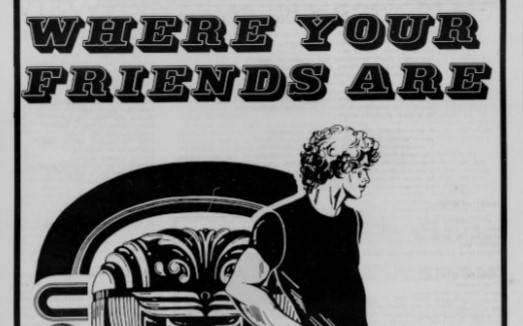As the Library of Virginia approaches its bicentennial next year, it is a good time to reflect on what collections the Library holds but also those collections it does not. Created in 1823 as the library and archives for the state government, the collections housed here tend to reflect the experiences of those in power in the government – mainly white straight cisgender men. Gregory Samantha Rosenthal points out in her book Living Queer History that even something as seemingly benign as creating a historic district can be fraught by prioritizing one aspect of a location’s history as the seemingly “correct,” “authorized,” or at the very least “more respectable” one. Rosenthal feels that this is the case with the Salem Avenue-Roanoke Automotive Commercial Historic District, which prioritized memorializing the areas past automotive shops rather than the LGBTQ+ community which was active in the same area in the 1970s.1
Even well-intended attempts to rectify such gaps, often called archival silences, now can cause unintended pain and consequences. Many people are rightfully skeptical about sharing their records with the very same government that either did not care enough to collect them in the first place, or collected information that was used in problematic ways. Coerced speech is not free speech, so it is important that we preserve records that reflect an individual’s or group’s own presentation of themselves and their values alongside official records.
This is especially true when dealing with sexuality, gender identities, and race. We run the risk of putting labels on people from the past who would not have claimed those identities for themselves. This is one of the many reasons that primary sources (first-hand accounts created by people who were present at the time of an event) rather than later retellings are so important. The Southwest Virginia LGBTQ+ History Project detailed in Rosenthal’s book collects history in many different mediums such as oral histories, newsletters, and zines, but attempts to collect the information directly from those that experienced it, realizing that different generations and even individuals view the same events and concepts from different perspectives.
Virginia Chronicle, LVA’s digital newspaper project, includes issues from the aptly named Our Own Community Press, published by the Unitarian-Universalist Gay Caucus out of Norfolk from the 1976 to 1998 and Richmond Pride published by the Richmond Virginia Gay/Lesbian Alliance. At the time of its publication, many public libraries did not wish to circulate theses papers. If it had not been for individuals outside of the official archival institutions, many pieces of history such as these would be lost. No one newsletter can speak for a whole community, but being able to hear directly across time from a marginalized group of people gives us a better understanding of the past, one that we cannot find in the official record.
Governments, and by extension their institutions such as state archives, are often touted as the “voice of the people,” but archives in particular should strive not to be the voice, but to amplify it by providing access to what has already been written.
Join us and author Gregory Samantha Rosenthal online on Tuesday, November 15, 2022 at 6pm to discuss Living Queer History. Registration is free but required.
Resources
Virginia LGBTQ+ Websites and Digital Archives
- Southwest Virginia LGBTQ+ History Project
- The Fight for LGBTQ Rights (DC History Center)
- A History of DC Pride’s Places and Spaces (DataLensDC)
- LGBTQ America: A Theme Study of Lesbian, Gay, Bisexual, Transgender, and Queer History (National Park Service)
- LGBTQ Heritage in Virginia (Virginia Department of Historic Resources)
- LGBTQ+ History at Virginia Tech
- OutHistory
- Rainbow History Project
- Tidewater Queer History Project
Virginia LGBTQ+ Digitized Newspapers
- Blacklight, 1979–1985 (DC Library)
- An independent newspaper serving the Black gay and lesbian community of Washington, D.C.
- Our Own Community Press, 1977–1998 (LVA)
Norfolk-based monthly newspaper, which began as the newsletter of the Unitarian-Universalist Gay Caucus. - Richmond Pride, 1986–1990 (LVA)
Monthly publication of the Richmond Virginia Gay and Lesbian Alliance. - Washington Blade, 1969–2004 (DC Library)
Originally published as The Gay Blade, this Blade is the oldest LGBTQ newspaper in the United States and still serves the DC Metro area.
Virginia LGBTQ+ Books
- Ford, Charles Howard, and Jeffrey L. Littlejohn. LGBT Hampton Roads. Charleston, SC: Arcadia Publishing, 2016.
- Marschak, Beth, and Alex Lorch. Gay and Lesbian Richmond. Charleston, SC: Arcadia Publishing, 2008.
- Rolle, Elisa. Queer Places: Retracing the Steps of LGBTQ People Around the World. Volume 1.4: Eastern Time Zone : District of Columbia, Virginia, West Virginia. 4th edition. San Francisco, CA: Blurb, 2021.
Footnotes
1Gregory Samantha Rosenthal, in Living Queer History: Remembrance and Belonging in a Southern City (The University of North Carolina Press, 2021), p. 5.








